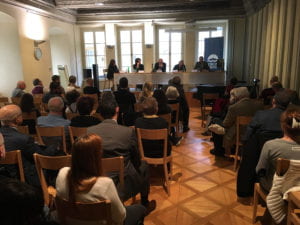
On April 5, 2018, NYU Prague is hosting a symposium on Population and Migration. Organized by NYU Prague, NYU’s Prague Institute for Democracy, Economy, and Culture and Forum 2000, the event will feature a panel discussion exploring how over the last few years, the phenomenon of migration has moved from a humanitarian domain into a public discourse and has become a powerful instrument for today’s populists and nationalists. The panel will consider the roots of this trend and why is there so much fear and hostility towards migrants and refugees particularly in Central European countries. Petr Mucha, professor of history and religious studies at NYU Prague, put together the program. The panelists come from diverse fields (media, sociology, political sciences, theology) and will discuss these themes from different perspectives. The focus of the discussion will be the Central European region and the phenomenon of fear which serves as a seed for hatred and extremist tendencies. In her keynote speech, Professor Regina Polak from University of Vienna will talk about ethical issues of migration, about the impact of the fear as well as about the revival of stereotypes (nationalism, Shoa, and World War II).
The Western perspective on migration and refugees was historically formed by Christian morals and modern concept of human rights. Eventually, in the aftermath of World War II, it found its expression in the Refugee Convention. Over the last few years, nevertheless, the phenomenon of migration has moved from the humanitarian domain into a public discourse and became a powerful tool of political campaigns. Moreover, it fuels a new wave of populism, nationalism, and racism in many western countries, including those, which have been considered resistant to these trends.
- Why has migration theme become such a powerful instrument for today´s populists and nationalists?
- Does this represent a new trend or is it rather a revival of similar stereotypes from the 20th century?
- What should be an appropriate response of democratic societies?
- How does this situation vary in different European countries and in the United States?
- Why is there so much fear and hostility towards migrants and refugees in the Central European countries which are not typical targets of migration?
Panelists:
Regina Polak, University of Vienna
Tomáš Lindner, Respekt
Martina Mašková, Czech Radio
Salim Murad, New York University Prague
Moderator:
Jiří Pehe, Director of New York University Prague
